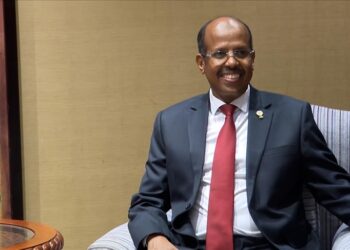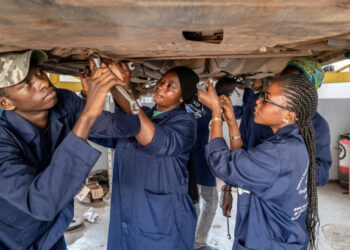The African Nations Championship (CHAN), designed specifically for players competing in their domestic leagues, is more than just a football tournament. It is a microcosm of African footballing potential and a vivid reflection of the continent’s socio-economic landscape. While the focus is naturally on the beautiful game, CHAN offers invaluable lessons and presents significant opportunities for Technical and Vocational Education and Training (TVET) across Africa. By analysing the challenges and successes revealed during CHAN, we can identify key areas where TVET can contribute to a more sustainable and prosperous future for the continent.
Lessons from CHAN: A Reflection of Development Gaps
Despite its excitement and display of raw talent, CHAN often exposes existing developmental gaps within African football and, by extension, the wider socio-economic context. Several key observations from past tournaments highlight the need to strengthen the TVET sector:
Infrastructure deficiencies
CHAN has frequently revealed shortcomings in stadium infrastructure, training facilities and even basic amenities for players and fans. This underlines a critical need for skilled professionals in construction, engineering and maintenance. TVET programmes focusing on these areas can supply the workforce to build and maintain world-class sporting infrastructure, contributing not only to football development but also to wider urban growth.
Limited access to quality sports equipment and apparel
The quality of sports equipment and apparel available to domestic league players often lags behind that of their international counterparts. This presents an opportunity for TVET programmes centred on textile manufacturing, sports equipment design and local production. By equipping young Africans with the skills to design and manufacture high-quality sporting goods, we can reduce reliance on imports and create local jobs.
Challenges in sports management and administration
Efficient sports management is essential for the success of any league or tournament. Yet many African leagues struggle with marketing, finance, logistics and governance. TVET programmes offering specialist training in sports administration, event management and sports marketing can equip individuals with the skills needed to professionalise the sector and attract investment.
Inadequate healthcare and physiotherapy support
The physical demands of professional football require access to quality healthcare and physiotherapy. During CHAN, reports often surface about the limited availability of qualified medical personnel and adequate rehabilitation facilities for players. TVET programmes focused on paramedical training, physiotherapy and sports medicine can address this gap and ensure the wellbeing and longevity of African footballers.
Limited media coverage and broadcasting capabilities
Although CHAN’s visibility is increasing, the quality and extent of media coverage still lag behind major international tournaments. This presents an opportunity for TVET programmes in media production, broadcasting and sports journalism. Training young Africans in these fields can enhance the visibility of African football and create new careers in sports media.
These observations demonstrate that the challenges faced by African football are closely linked to broader developmental issues, underscoring the pivotal role TVET can play in addressing them.
Opportunities for TVET in Africa: A Pathway to Sustainable Development
The lessons learned from CHAN offer a clear roadmap for how TVET can contribute to the sustainable development of African football and the continent as a whole. Key opportunities include:
Infrastructure development and maintenance – TVET programmes in construction, civil engineering, electrical engineering and plumbing can train skilled workers to build and maintain stadiums, training facilities and related infrastructure. Training in sustainable building practices and the use of locally sourced materials will further promote economic growth and environmental responsibility.
Sports equipment and apparel manufacturing – Programmes in textile manufacturing, fashion design and sports equipment design can empower young Africans to produce high-quality sporting goods locally, creating jobs and reducing import dependence.
Sports management and administration – Courses in governance, event management, sports marketing and financial management can professionalise the sports sector and ensure transparency and accountability.
Healthcare and physiotherapy support – Training in paramedical services, physiotherapy, sports medicine and nutrition will help prevent injuries, improve rehabilitation and enhance player performance.
Media production and broadcasting – Programmes covering camera operation, editing, sound engineering and content creation will enable Africans to tell their own sporting stories and promote football globally.
Commercialisation of Skills
The CHAN tournament clearly demonstrates that every skill, once well developed, carries financial benefits for individuals and communities—whether through allowances, winning bonuses or salaries. TVET programmes must position trainees to derive financial rewards from their expertise.
Strengthening the TVET–Sport Connection
Large sporting events rely on a host of skilled people working both on the frontline and behind the scenes—fitness instructors, chefs, fleet managers and many others. The shared cost of hosting CHAN across three countries is a valuable lesson for the TVET sector as it continues to emphasise the establishment of national Centres of Excellence. With the East African Skills for Transformation and Regional Integration Project (EASTRIP) now expanding beyond three countries, it is time to create continental Centres of Excellence in sectors such as aviation and hospitality. Shared hosting also catalysed investment in sports infrastructure that might otherwise have taken years to materialise.
Trusting Generation Z
Recent CHAN tournaments have shown the importance of trusting young people. Uganda relied on 25-year-old Allan Okello for decisive penalty kicks, while Sudan’s 18-year-old Musa Hussein and Kenya’s 19-year-old Manzur Suleiman Okwaro made significant contributions to their teams’ success. If Generation Z can be trusted to chase the tournament’s USD 10.5 million prize, why not welcome their input into Africa’s TVET growth and development?
Establishing African TVET Games
CHAN is a timely reminder for the TVET sector to establish Africa-wide TVET Games, building on existing national and regional competitions. Universities have the All-Africa University Games; it is time to consider a continental equivalent for TVET. Such events would showcase technical talent and prove that one can be both a professional technician and a sportsperson.
Harnessing the Volunteer Base
Globally, over a billion people volunteer in social and humanitarian causes. CHAN’s local organising committees made strong use of volunteers, offering a model for the TVET sector. By tapping into local, national and global volunteer networks, TVET institutions can expand their reach and impact.
In summary, the lessons and opportunities presented by CHAN are both practical and timely. Every TVET stakeholder in Africa is encouraged to adopt those most relevant to their context.
____________________
Co-authored by: Mulihi Bumali TVET Champion at Pamoja Careers Services in Uganda and Adilla Anyanzwa TVET Expert and Principal at Umma University TVET Institute in Kenya.
Email.ID. mulihib@gmail.com
X : @mulihiB
LinkedIn: Mulihi Bumali



















































































 EduTimes Africa, a product of Education Times Africa, is a magazine publication that aims to lend its support to close the yawning gap in Africa's educational development.
EduTimes Africa, a product of Education Times Africa, is a magazine publication that aims to lend its support to close the yawning gap in Africa's educational development.